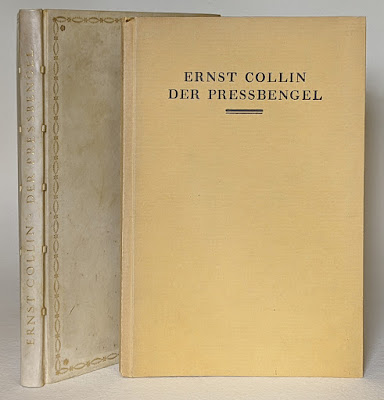Sometime late this summer while googling around aimlessly, I found a link to what was described as the deluxe edition of Ernst Collin's Pressbengel bound in full parchment. This was on my bucket list and given that it was limited to 30 copies bound in either full leather or parchment, the time it was published in, and the history of that time, including WW II, I felt it was nothing but a dream. The Heftlade the journal of the Jakob-Krause-Bundes published by Ernst Collin had an advertisement for the Pressbengel. A copy of the deluxe in leather is depicted in the Max Hettler collection collection in Stuttgart, the binding for both variants bound for the Euphorion Verlag by Hübel & Denck in Leipzig.
 |
| Regular with spine of deluxe bound in parchment at left. The title stamping is identical between the leather and parchment variants of the deluxe edition. |
 |
| Der Pressbengel, 1000 copies bound in paper, 30 copies on handmade Zanders rag paper, bound in full leather or parchment. |
 |
| 85 [Gold] Marks for the deluxe, 4.50 for the paper binding |
Anyhow, back to the listing I found googling... I had not given myself a top-end budget for the deluxe, so ordered on the spot and had it arrive ca. 3 weeks later. Below pictures with some detail views that also raised questions...
 |
| Spine and front of deluxe. The book was sewn on 5 parchment slips. |
 |
| Colophon indicating this copy number 7. |
 |
| Top edge gilt with hand-sewn endband. All leaves are perfectly flush and gilt. |
 |
| An Euphorion [Verlag] binding. Note the sloppy trimming with the blue (fill?) underneath. |
 |
| Bound at Hübel & Denck in Leipzig. |
 |
| Handmade rag paper for the text block measures 10 thousandths of an inch or .25 mm. Rather thick and stiff... |
In the article, Collin wrote "that the bindings he viewed for the article were less than beautiful (wenig schön) but serviceable exemplars of what we would consider fine bindings... The bindings are stamped with Euphorion Verlag and Hübel & Denck Leipzig." Keeping in mind the exponential increase in luxury editions, Collin wrote that the owner of such an edition is [still] entitled to work that represents the best in terms of craft and aesthetics, balanced against the cost pressures exerted on the publisher, and always bound by hand. Production of these bindings was managed by Heinrich Bahle who was a member of the Jakob-Krause-Bundes (precursor to the Meister der Einbandkunst). Collin notes that by indicating the relationship between publisher and binder that it was a joint effort. This also includes the effort that went into the work of the publisher, such as negotiating with the printer about type face and typography, something that is not always as perfect as it should be at the beginning of a relationship. Continuing, Collin notes that these bindings are created using classical tooling patterns and that the judgement of the expert bookbinder is critical, given that the publisher is not an expert in these areas. He closes with the remark that the illustrated bindings are representative of this collaboration, even if they can only give a weak impression of the beauty of the work. Taken together, Collin seems to be indicating that while a good start, the relationship and results of Euphorion and Hübel & Denck has room for improvement. Collin writing this article and then publishing his Pressbengel with the same publisher, a regular occurrence for him and others illustrates how tight-knit the bibliophilic fields were.
This was written a year before the Pressbengel was written and published. Examining my binding of the deluxe in parchment closely leaves me in agreement with some of Collin's sentiments in the article. I cannot tell whether the "sloppiness" where the doublure was trimmed and the staining and abrasion in the joint of same are the result of a repair or regular production, but the choice of very heavy paper, more like cover stock really, and other details lead me to believe the latter. Other factors include that the deluxe was likely bound on sale to the collectors preference and the overall impact of hyperinflation on labor, materials, moral, ... meaning that it may have been "good enough".



No comments:
Post a Comment